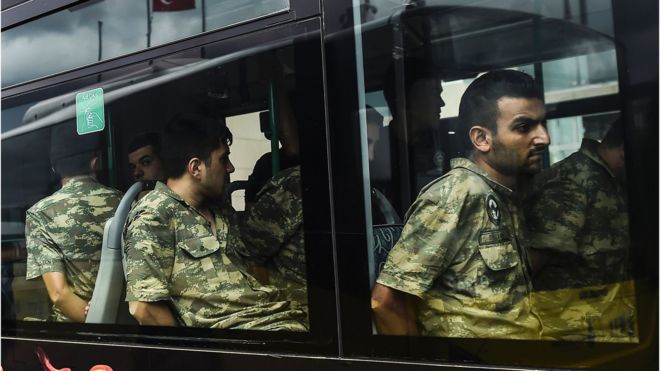
Soldiers detained for suspected coup involvement are brought to court in Istanbul
Turkey has formally charged 99 generals and admirals in connection with the weekend’s thwarted coup attempt – just under a third of the country’s 356 top military officers.
President Erdogan is meeting with loyal commanders and his cabinet in Ankara.
Authorities have banned all academics from travelling abroad, as the purge of state employees suspected of being connected to the failed coup continues.
More than 50,000 people have been rounded up, sacked or suspended.
So far about 1,577 university deans (faculty heads) have been asked to resign in addition to 21,000 teachers and 15,000 education ministry officials.
hey are suspected of having links to the alleged mastermind of the coup, US-based cleric Fethullah Gulen – who denies any involvement.
- Who’s the target of Erdogan’s purge?
- Cleric Gulen condemns post-coup ‘witch-hunt’
- How mobiles beat tanks and saved Erdogan
- Who was behind coup attempt?
- Why did Turkish coup plot fail?
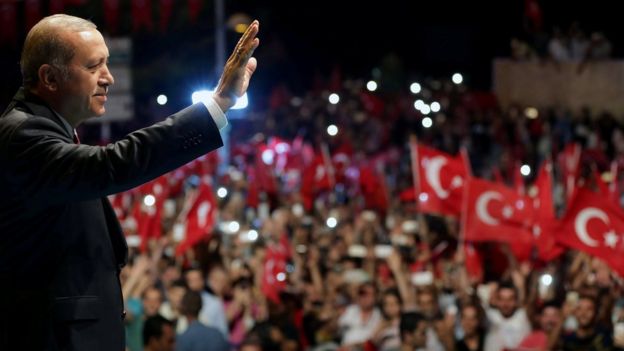
President Erdogan, seen here outside his Istanbul home, is now back in Ankara for meetings
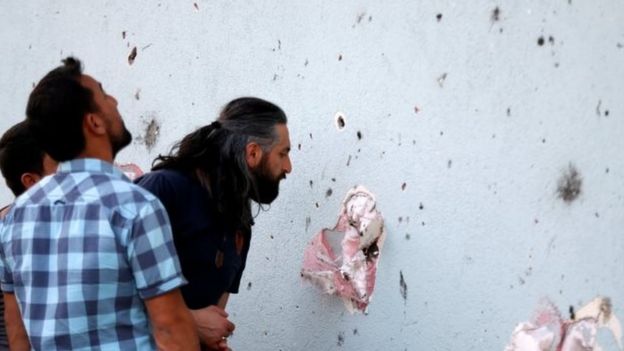
Turkey is struggling to return to normal in the aftermath of last week’s abortive coup
As soon as it became clear that the coup had failed, the purges began – first with the security forces, then spreading to Turkey’s entire civilian infrastructure.
Human rights group Amnesty International has warned the purges are being extended to censor media outlets and journalists, including those critical of government policy.
“We are witnessing a crackdown of exceptional proportions in Turkey at the moment.
“While it is understandable, and legitimate, that the government wishes to investigate and punish those responsible for this bloody coup attempt, they must abide by the rule of law and respect freedom of expression,” Amnesty’s Turkey researcher Andrew Gardner said.
Mass ruling party email leak – BBC Monitoring

The WikiLeaks website has been blocked in Turkey after it released thousands of emails purportedly showing exchanges between ruling AKP officials.
The documents – ranging from this month back to 2010 – were obtained a week before the attempted coup and the source has no connection to that event, WikiLeaks says.
Turkish daily Cumhuriyet said that one of the emails contained a letter sent to President Erdogan.
“My family and I suffered in our own country because of your actions. Aren’t we as precious as Egyptian Esma?” it says, in a reference to Mr Erdogan’s tears on TV after the daughter of a Muslim Brotherhood politician was killed in Egypt.
Other emails contain media reports on Fethullah Gulen and his movement.
Turkey has now extended the clear-out to the education sector in its desire to root out Gulen supporters.
The Higher Education Council has asked university rectors to “urgently examine the situation of all academic and administrative personnel” linked to what it calls the Fethullah Terrorist Organisation (Feto) and report back by 5 August.
It has also told universities that academics who are already abroad on work or study missions should return home “within the shortest possible time”.
A government official told the Reuters news agency that the ban on academics travelling abroad was a temporary measure implemented to stop alleged coup plotters in universities from fleeing abroad.
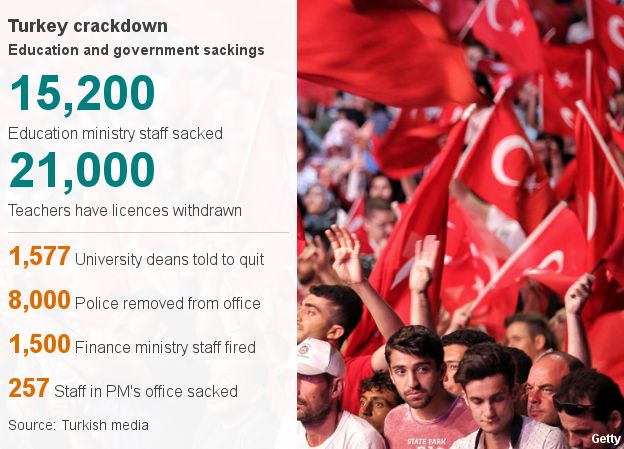
Turkey is pressing the US to extradite Mr Gulen and the issue was raised during a phone call between US President Barack Obama and President Erdogan on Tuesday, the White House said.
Spokesman Josh Earnest said a decision on whether or not to extradite would be made under a treaty between the two countries.
In a separate development Turkey has barred access to the WikiLeaks website soon after it posted about 300,000 emails sent by President Erdogan’s AK Party dating from 2000 to early July 2016.
Wikileaks said that although the documents were obtained before the attempted coup, the date of their publication was brought forward “in response to the government’s post-coup purges”.
The source of the emails was not linked to the coup plotters or to a rival political party or country, WikiLeaks said.
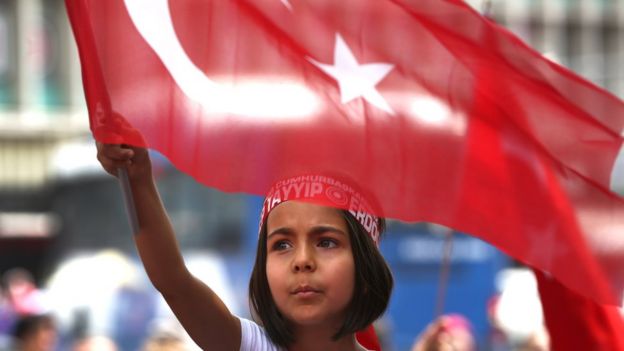 Supporters of President Erdogan are continuing to rally in major cities
Supporters of President Erdogan are continuing to rally in major citiesTurkey’s military also announced on Wednesday that it had resumed cross-border strikes against Kurdish rebel targets in northern Iraq, killing about 20 alleged militants. They were the first since the attempted coup.
F-16 jets were reported to have targeted positions of the banned Kurdistan Workers Party (PKK) in Iraq’s Hakurk region, Anadolu Agency reported.
The Turkish military has regularly targeted suspected PKK bases in Iraq since last year.
BBC
 Q FM Africa's Modern Radio
Q FM Africa's Modern Radio